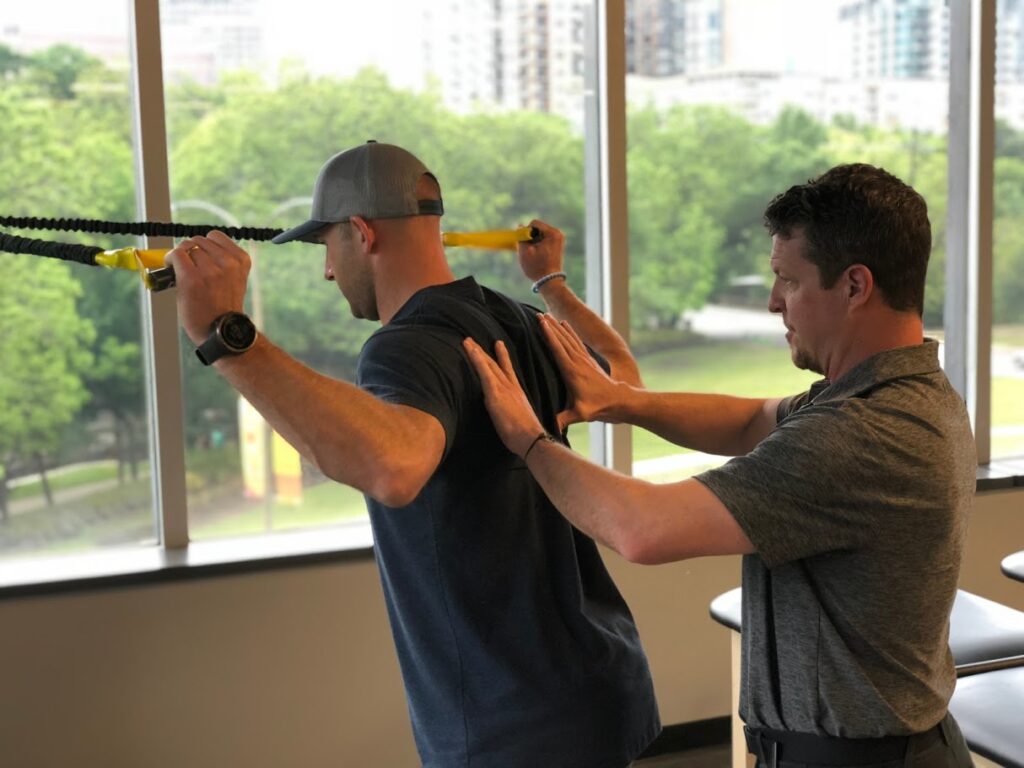
Use this free independent personal trainer contract with gym template agreement to establish a trainer to gym contract.

Are you a personal trainer looking to solidify your business relationship with a gym? Or are you a gym owner in need of a standardized agreement with your personal trainers? Either way, creating a personal trainer contract with a gym is a crucial step in establishing a mutually beneficial professional partnership.
Get a free personal trainer agreement with gym template below and then in this article, we will delve deep into the intricacies of personal trainer contracts and provide you with an in-depth guide to understanding, creating, and negotiating a comprehensive agreement. By the end of this article, you will have a clear understanding of the key elements to include in your contract, how to protect your rights, and best practices for reviewing and updating your agreement.

This article provides a comprehensive guide on creating a solid agreement that protects both parties and outlines the terms and conditions of the trainer-gym relationship. Be sure to also check out our free personal trainer rental agreement template to make renting space in your fitness facility to a personal trainer easy.
And, of course, managing your fitness business online with the best gym management software and the best personal training software means that you can easily manage your business online with software that automates your business and saves you time. Communicate with members and clients with email, SMS, and in-app messaging marketing cadences, you can create fitness session plans, waivers, forms, fitness assessments, lead forms, registration forms, offer online booking, workout plans, and much more.
Use the Exercise.com workout plan creator to create your workout plans and fitness assessments.

Publish your custom branded fitness apps to iOS and Android so you can offer a premium experience to your community.

Run fitness challenges, create online workout groups, do distance training, and of course, deliver fitness assessments and workouts, all right within the Exercise.com platform (custom branded to your brand).


“Developing an easy intake system with my apps and ways to scale the delivery of workouts has been huge. Working with 20-30 individuals who each have specific goals and restrictions can be challenging, but your platform makes it easy to organize everyone’s programs and put a plan together that will get them the best results possible. The simple, effective tools help expand and simplify my coaching process.”
Dean Somerset Owner, Somerset Fitness[Gym’s Name or Business Name]
Independent Personal Trainer Agreement
This Agreement is made and entered into this [Date] by and between [Gym’s Name], (“Gym”) and [Trainer’s Name] (“Independent Personal Trainer”).
1. Engagement and Services:
2. Relationship of Parties:
3. Compensation and Payment:
4. Use of Facilities:
5. Insurance and Liability:
6. Client Solicitation and Retention:
7. Termination:
8. Confidentiality:
9. Entire Agreement:
Independent Personal Trainer’s Signature: ____________________________________
Date: ____________
Gym Representative’s Signature: ________________________________________________
Date: ____________
[Additional Provisions or Special Terms if Any]
This independent personal trainer contract with gym template outlines the terms and conditions for personal trainers who operate within a gym as independent contractors. It covers essential aspects such as the scope of work, compensation, facility usage, insurance requirements, and client management. This contract ensures a clear understanding between the gym and the independent personal trainer, providing a foundation for a professional and mutually beneficial relationship. Customization may be necessary to align with specific gym policies and local regulations, and it is advisable to have the contract reviewed by legal counsel.

“Working with Exercise.com and their team has been an amazing experience and a dream come true in terms of accomplishing a vision! Their workout technology has helped us effectively engage our community, and I highly recommend Exercise.com to grow your business!”
Andrew Banner Co-Founder, AMPD Golf PerformancePersonal trainers often work as independent contractors in gyms, which means that they are not employed directly by the gym. In this scenario, having a contract in place offers several benefits for both parties involved. For personal trainers, a contract ensures that the terms and conditions of their employment are clearly defined, protecting their rights and setting expectations. Moreover, a contract can outline important matters such as payment, liability, and termination clauses.
For gyms, having personal trainer contracts is equally essential. A contract allows gyms to establish control over their trainers and maintain consistency in their operations. By clearly outlining the obligations and responsibilities of trainers, gyms can ensure that their staff is aligned with their business objectives and uphold the highest standards of professionalism.
One additional benefit of personal trainer contracts for trainers is that it can provide a sense of security and stability. With a contract in place, trainers can have peace of mind knowing that they have a formal agreement with the gym, which can help protect them from sudden changes or unexpected termination. This can be especially important for trainers who rely on their income from the gym as their primary source of livelihood.
Furthermore, personal trainer contracts can also include provisions for professional development and growth opportunities. By including clauses that outline opportunities for continuing education, certifications, or mentorship programs, trainers can enhance their skills and knowledge, which can ultimately benefit both themselves and the gym. This can lead to improved client satisfaction, increased client retention, and ultimately, a stronger reputation for the gym in the fitness industry.
A personal trainer contract is a legally binding agreement between a personal trainer and a gym. It serves as a foundation for a professional relationship and sets out the terms and conditions that both parties agree to abide by. By clearly stating the rights, obligations, and responsibilities of both parties, a contract provides clarity and protection.
One of the key benefits of a personal trainer contract is that it establishes a mutual understanding of expectations. For personal trainers, this means knowing what is expected of them in terms of working hours, payment, and client management. For gym owners, a contract ensures that trainers adhere to the rules and regulations of the facility, maintain professional conduct, and meet performance standards.
Another crucial aspect of a personal trainer contract is protection. A well-drafted contract can help safeguard personal trainers and gym owners against potential disputes, liability claims, or breaches of confidentiality. By clearly defining liability and insurance provisions, a contract can minimize legal risks and protect the interests of both parties in the event of an unforeseen circumstance.
Furthermore, a personal trainer contract can also outline the termination and cancellation policies. This includes specifying the notice period required for either party to terminate the agreement, as well as any penalties or fees associated with early termination. Having these provisions in place can help prevent misunderstandings and ensure a smooth transition if either party decides to end the professional relationship.
In addition, a personal trainer contract can address intellectual property rights. This can include ownership of any training programs, workout routines, or other materials developed by the personal trainer during the course of their work. By clearly stating who owns the intellectual property and how it can be used, the contract can protect the personal trainer’s creative work and prevent any unauthorized use or distribution.
When creating a personal trainer contract with a gym, certain key elements should be included to ensure a comprehensive and effective agreement. These elements set the foundation for a successful professional relationship and safeguard the interests of both parties. Here are the essential components to consider:
1. Identification and Contact Information: Include the names, addresses, and contact details of both the personal trainer and the gym.
2. Scope of Services: Clearly outline the services the personal trainer will provide, specifying the type of training, duration, and any additional responsibilities.
3. Compensation: Define how the personal trainer will be compensated, including rates, payment frequency, and any commission structures.
4. Working Hours and Schedule: State the agreed-upon working hours, days, and any flexibility or availability requirements.
5. Termination Clause: Specify the conditions under which either party may terminate the agreement, including notice periods and grounds for termination.
6. Client Confidentiality: Address the protection of client information and any non-disclosure requirements.
7. Liability and Insurance: Clearly define the liability of both parties and outline insurance coverage requirements.
8. Intellectual Property: Specify ownership rights to any intellectual property created during the personal trainer’s employment, such as training programs or marketing materials.
9. Dispute Resolution: Outline the steps and procedures for resolving any disputes that may arise during the term of the agreement.
10. Governing Law: Specify the jurisdiction and governing law that will apply in case of any legal disputes.
11. Entire Agreement and Amendments: Clearly state that the contract represents the entire agreement between both parties and outline the procedures for amending or modifying the agreement.
By including these key elements, you can ensure that your personal trainer contract covers all essential aspects and provides a solid framework for your professional relationship.
12. Indemnification: Include a clause that outlines the indemnification responsibilities of both the personal trainer and the gym. This clause should specify that each party will be responsible for any claims, damages, or liabilities arising from their own actions or negligence.
By including an indemnification clause, both parties can protect themselves from potential legal and financial consequences that may arise during the course of their professional relationship.

Excellent choice for my business! I tried nearly all the “major” platforms and found Exercise.com to be the most intuitive.